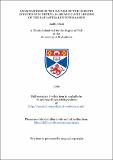Files in this item
Examinations of the nature of the deficits induced by n-methyl-D-aspartic acid lesions of the rat lateral hypothalamus
Item metadata
| dc.contributor.advisor | Winn, Philip | |
| dc.contributor.author | Clark, Judith | |
| dc.coverage.spatial | [ca 350] p. | en_US |
| dc.date.accessioned | 2018-06-28T11:14:39Z | |
| dc.date.available | 2018-06-28T11:14:39Z | |
| dc.date.issued | 1990 | |
| dc.identifier.uri | https://hdl.handle.net/10023/14703 | |
| dc.description.abstract | The lateral hypothalamic syndrome of aphagia, adipsia akinesia and sensorimotor impairments induced by electrolytic lesions of the lateral hypothalamus (LH) has been suggested to be due to the destruction of two components of a single system controlling feeding and drinking behaviour. While the "motor" component has been attributed to disruption of dopaminergic fibres, it has been suggested that destruction of intrinsic LH neurones induces a "motivational" deficit. The nature of this motivational deficit was investigated using the excitotoxin N-methyl-d~aspartic acid (NMDA) to lesion cell bodies and leave fibres of passage intact. Such lesions induced temporary reductions in body weight, food and water intake and residual deficits in response to some physiological challenges. Most animals recovered food and water intake and body weight gain after a short period of time. It was shown that LH lesioned rats were able to perceive and respond to the palatability of food/fluid; they responded physiologically to intracellular dehydration caused by hypertonic saline injections, although they did not respond behaviourally; they responded as controls to a battery of long-term, "positive" physiological challenges, but not to short-term, "negative" ones; and they displayed increased rate of development of schedule-induced polydipsia and tail pinch-induced eating, demonstrating that they had no motor impairments and that they did not have an "activational" deficit. These results indicate that the LH cannot be regarded as a feeding or drinking "centre" and that the motivational deficit following lesions of the LH is of a very complex nature. The implications of these data for the function of the LH are discussed in relation to electrophysiological and anatomical studies. | en_US |
| dc.language.iso | en | en_US |
| dc.publisher | University of St Andrews | |
| dc.subject.lcc | QP383.7C7 | |
| dc.subject.lcsh | Hypothalamus | en |
| dc.title | Examinations of the nature of the deficits induced by n-methyl-D-aspartic acid lesions of the rat lateral hypothalamus | en_US |
| dc.type | Thesis | en_US |
| dc.type.qualificationlevel | Doctoral | en_US |
| dc.type.qualificationname | PhD Doctor of Philosophy | en_US |
| dc.publisher.institution | The University of St Andrews | en_US |
This item appears in the following Collection(s)
Items in the St Andrews Research Repository are protected by copyright, with all rights reserved, unless otherwise indicated.

